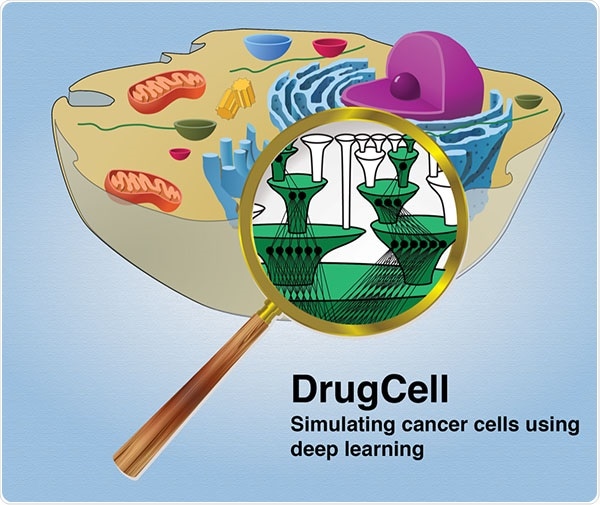The U.S. Food and Drug Administration (FDA) has given final approval to only 4% of all cancer therapeutic drugs being developed.

Experimental artificial intelligence system DrugCell predicts the best drugs to use against a tumor. Image Credit: University of California San Diego Health Sciences.
That’s because right now we can’t match the right combination of drugs to the right patients in a smart way. And especially for cancer, where we can’t always predict which drugs will work best given the unique, complex inner workings of a person’s tumor cells.”
Trey Ideker, PhD, Professor, University of California San Diego School of Medicine and Moores Cancer Center
In an article published in the Cancer Cell journal on October 20th, 2020, Ideker along with Brent Kuenzi, Ph.D., and Jisoo Park, Ph.D., both postdoctoral researchers in his laboratory, has explained a new artificial intelligence (AI) system, called DrugCell, that was developed by them. This system can match tumors to the best drug combinations and it also does it in a way that can be comprehended by humans.
Ideker, who is also the co-director of the Cancer Cell Map Initiative and the National Resource for Network Biology, added, “Most AI systems are ‘black boxes’—they can be very predictive, but we don’t actually know all that much about how they work.”
Ideker provided an example of how an internet image search for “cat” actually works. AI platforms that work behind the scenes are trained on prevailing cat images; however, how they really mark a new image as “cat” instead of “rat” or something else is not known.
According to Ideker, if AI is aimed to benefit the health care sector, then one should be able to view inside the black box to interpret how the system reaches a conclusion.
Ideker added, “We need to know why that decision is made, what pathways those recommended drugs are targeting and the reasons for a positive drug response or for its rejection.”
The researchers’ work on the DrugCell platform started many years ago in yeast. In an earlier study, the team created an AI system known as DCell using data about the genes and mutations of a yeast cell. The DCell system estimated cellular behaviors, including growth, all beyond the “black box.”
DrugCell is a next-generation version of the DCell system. It was trained on over 1,200 tumor cell lines, and their responses to almost 700 FDA-approved and experimental therapeutic medications—a total of over 500,000 cell line and drug pairings have been validated. The team also confirmed some of the conclusions made by DrugCell in lab experiments.
Using the DrugCell platform, the researchers can input data about a specific tumor and the system will return the best-recognized drug; the biological pathways that regulate the reaction to that drug; and also the combinations of drugs to optimally treat the malignancy.
The Moores Cancer Center at UC San Diego Health already offers precision cancer therapy. In this center, patients could have a biopsy of their tumor sequenced for mutations and evaluated by the Molecular Tumor Board, an interdisciplinary team of experts.
The board suggests personalized therapies on the basis of the unique genomic alterations and other data of a patient. A new study has demonstrated that such patients have better outcomes. In a way, the DrugCell system replicates the human Molecular Tumor Board.
We were surprised by how well DrugCell was able to translate from laboratory cell lines, which is what we trained the model on, to tumors in mice and patients, as well as clinical trial data.”
Brent Kuenzi, PhD, Postdoctoral Researcher, University of California San Diego School
The ultimate aim of the researchers is to deploy the DrugCell platform into clinics to benefit the patients; however, the study authors warned that there is still more work to do.
While 1,200 cell lines is a good start, it’s of course not representative of the full heterogeneity of cancer. Our team is now adding more single-cell data and trying different drug structures. We also hope to partner with existing clinical studies to embed DrugCell as a diagnostic tool, testing it prospectively in the real world.”
Jisoo Park, PhD, Postdoctoral Researcher, University of California San Diego School
Source:
Journal reference:
Kuenzi, B. M., et al. (2020) Predicting Drug Response and Synergy Using a Deep Learning Model of Human Cancer Cells. Cancer Cell. doi.org/10.1016/j.ccell.2020.09.014.